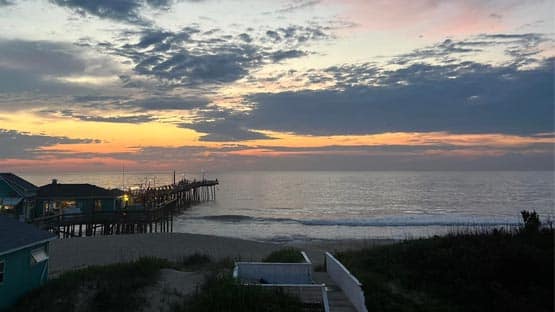
The National Oceans and Coastal Security Improvements Act would improve upon the current coastal resilience grants programs through the National Oceanic Atmospheric Administration (NOAA) and the National Fish and Wildlife Foundation (NFWF).
The bill would specify percentages for how the National Oceans and Coastal Security (NOCS) Fund shall be used for a block grant program and a national competitive grant program, and detail specific eligible uses for the Fund’s grant programs.
U.S. Rep. Don Beyer of Virginia and Congresswoman Jenniffer González-Colóno of Puerto Rico today introduced the legislation to support coastal communities’ ability to prepare for and respond to a variety of coastal threats, including flooding, extreme weather events, climate hazards and changing ocean conditions by improving coastal infrastructure and supporting coastal research, resiliency, conservation and restoration work.
“We are already experiencing the effects of sea-level rise both here in Northern Virginia and across the country, which is the reason resiliency planning is so important,” Beyer said. “Congress must do more to enhance coastal resilience efforts, so that our communities have the resources necessary to prepare for, respond to, and mitigate the impacts of flooding and other extreme weather events. I thank my colleague Congresswoman Jenniffer Gonzalez-Colon for her leadership on the National Oceans and Coastal Security Improvements Act so we can protect our coasts for generations to come.”
González-Colón said that protecting American coastlines and investing in restoration projects is essential to build communities on the coast to have resiliency against extreme weather.
“The National Coastal Resilience Fund serves as an important source of federal funding to carry out such initiatives across the nation. Since the program’s establishment in 2018, for example, NOAA and the National Fish and Wildlife Foundation have supported multiple projects in Puerto Rico to help strengthen coastal infrastructure, build capacity, and restore our islands’ coral reefs, mangrove forests, and sand dunes. I’m proud to partner with Congressman Don Beyer to introduce the National Oceans and Coastal Security Improvements Act and further support these efforts. This bipartisan legislation will ensure the National Coastal Resilience Fund can continue supporting coastal research, conservation, and restoration projects across the country. It would also provide NOAA the necessary resources to implement a block grant program to better respond to the resilience needs of our coastal states and territories,” González-Colón said.
According to Daniel Hayden, President of Restore America’s Estuaries, the legislation “cost effectively directs funding for restoration, protection, or maintenance of ocean, coastal and Great Lakes resources at a scale that enhances coastal and community resiliency.”
“Coastal communities are facing numerous costly challenges due increasing coastal hazards that threaten the infrastructure, livelihoods, and ecosystems they rely upon. The updates made under the National Ocean and Coastal Security Improvement Act, allow Coastal States, territories and tribes to more effectively and wholistically access and utilize funds to help plan for, mitigate the impacts of and respond to coastal hazards. This includes extreme weather events such as hurricanes and typhoons, but also long-term coastal changes,” said Derek Brockbank, Executive Director of Coastal States Organization. “These challenges extend far beyond any single state’s border, so the bill also encourages interstate collaboration address these issues through entities such as the Regional Ocean Partnerships.”
Alexandra Carter, Policy Director at Urban Ocean Lab, said that coastal communities and cities are impacted by rising sea levels, intensifying storms and other climate hazards. The legislation “can help provide needed federal support to improve the resilience of coastal communities, economies, infrastructure, and ecosystems in the face of the climate crisis.”
The bill would help communities go beyond being “storm-ready,” by allowing them to efficiently adapt to changing economic, social and environmental conditions and effectively respond to new threats to infrastructure, local economies, ecosystem health and national security.










